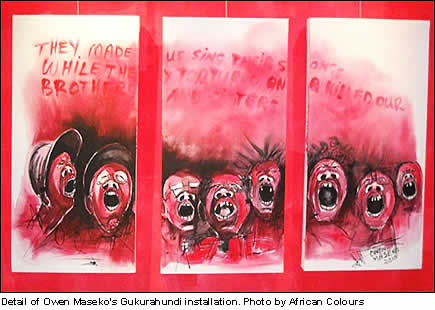Hugh Masekela’s song for my Christmas shopping list
Wednesday, November 17th, 2010 by Thandi MpofuChristmas decorations are up in most supermarkets indicating that the festive season is just around the corner and that mindless spending on food, drink and gifts can begin.
Had I the financial means I would add onto my Christmas shopping list Hugh Masekela’s song ‘Send Me’ and mail a copy of the track to every politician in office. This idea was inspired after reading Tawanda Chisango’s glowing review about the track’s rich Afro Jazz sound and moreover, its positive message. Describing the song as “spiritually uplifting” my immediate thought was that it would surely have some impact in reviving our seemingly lifeless statesmen to some noticeable action.
Primarily, I am hoping that the mere title of the song ‘Send Me’ will remind politicians that they have mandates to fulfil, as given by their constituents. All too often, it happens that public servants develop amnesia once elected into office and they forget that national, and not personal, development is paramount. In bestowing ‘Send Me’ as a gift perhaps our elected office bearers would remember that they were indeed sent, by us and for us. Maybe then we could get a bit more from them than ribbon cutting or the signing of yet another memorandum of agreement with ambiguous benefits for the masses.
Chisango writes: “The song is about someone … who is asking … to be sent so that they may be there when all the problems have been solved”. I imagine how nice it would be to have elected officials who actively find solutions to problems (or challenges, if we must use the more politically fashionable term), and not the more usual case where the politicians are the problem. Masekela’s song could inspire those in office to stop the tirades and the finger pointing in a westerly direction. After all, the purpose of putting politicians in power is not so that they can list the problems obvious to us all, but that they can find solutions to them.
But to fix a problem, you have to know that it exists and to do this you have to be in touch with the situation on the ground. Chisango explains that the person in the song is willing to go everywhere to assist the situation – to the railways, taxis, shebeens, buses, and the whole country. I admit that this is a tall order for our honourable representatives, who typically only visit their constituencies during election periods when they are garnering votes. How does one keep in touch with reality when they are surrounded (and shielded) by beefy bodyguards, heavily tinted car windows and nine-feet thick concrete walling? However, I believe that a new political norm is possible where statesmen actually live in the real world, amongst their constituents and assisting to better all our lives.
Although Masekela’s song is centred on being sent to tackle the HIV/AIDS pandemic, its message makes it relevant to all difficult circumstances that require the intervention of a champion or advocate. Elected officials take note. Being ‘honourable’ is not only a title that comes with the job; it indicates that there is a job to be done. The honour comes from being chosen and sent as a reliable campaigner for the people, to confront every difficulty no matter its size or its source and to improve circumstances for all of us.
You can download Send Me here











